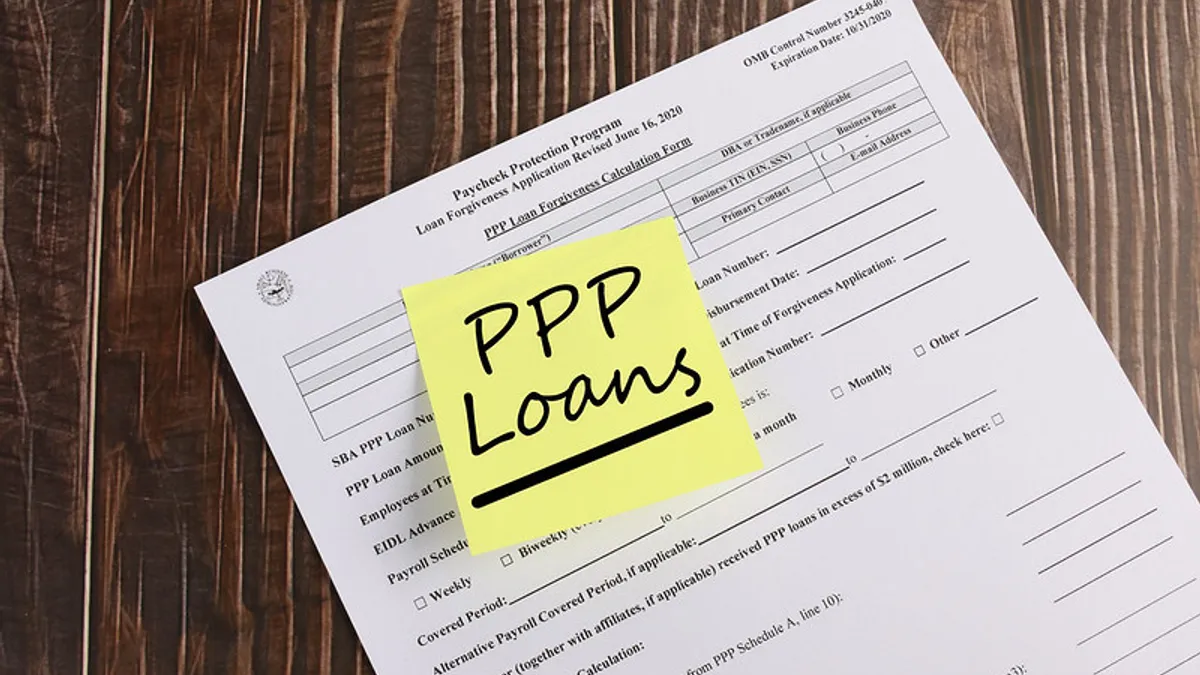Dive Brief:
- Black small business owners were less likely to secure Paycheck Protection Program (PPP) loans from small banks, and instead found more success after turning to fintechs or large lenders which used automated loan vetting, according to an economic working paper by New York University researchers released Monday.
- The study found that after controlling for a firm’s ZIP code, industry, loan size, PPP approval date, and other characteristics, Black-owned businesses were 12.1 percentage points more likely to obtain their PPP loan from a fintech lender than a traditional bank. "Among conventional lenders, smaller banks were much less likely to lend to Black-owned firms, while the Top-4 banks exhibited little to no disparity after including controls," the researchers wrote.
- Automated loan vetting, commonly used by fintechs and larger banks, improved approval rates for Black borrowers who sought loans at both nonbanks and the nation’s largest institutions, the researchers concluded.
Dive Insight:
The researchers said they found evidence that when small banks automate their lending processes, and reduce human involvement in the loan origination process, their rate of PPP lending to Black-owned businesses increases, with larger effects in places with more racial animus.
"Fintech lenders almost fully automate their underwriting processes, leaving little scope for preference-based discrimination to affect the approval decision," the researchers wrote. "In contrast, conventional lenders traditionally rely more on human involvement and personal relationships between loan officers and clients."
The researchers said they found a sizable variation in the degree of automation across traditional lenders, "with larger banks — those where we see little difference in the conditional probability of lending to Black-owned businesses — being more automated than smaller banks."
Sabrina T. Howell, an assistant professor of finance at New York University’s Stern School of Business and the lead author of the paper, told The New York Times the research illustrates how technology can help level the playing field for borrowers.
"The human brain is a much scarier black box than any machine-learning algorithm," Howell said. "You can constrain an algorithm to meet fair-lending standards and you can ensure the data it trains on isn’t biased. That may be hard to do, but it’s a clear and objective possibility. Whereas when you have a human loan officer who is in front of someone and making a decision, you can never do that."
The Independent Community Bankers of America (ICBA), however, pushed back at the study’s conclusions, telling The Times community banks had "outperformed the rest of the banking industry in serving minority-owned, women-owned, and veteran-owned businesses."
The group took issue with some of the methods the researchers used to determine an applicant’s race.
The researchers used Census Bureau data on business owners’ locations and surnames to project what race they were likely to be, since collecting data on borrowers’ ethnicity was optional for lenders.
The ICBA said those steps turned the research into "an unreliable guessing game."
The NYU study is the latest research report to analyze the $806 billion loan program, which was designed to provide forgivable loans to small businesses struggling amid the pandemic-related lockdowns.
One study released by the Federal Reserve Bank of New York in May also concluded that Black-owned businesses were more likely to turn to nonbanks and fintechs to secure PPP loans than business owners of other races or ethnicities.
One in four Black business owners that sought a PPP loan used a fintech rather than a traditional bank — more than twice the rate of White-, Asian-, and Hispanic-owned firms, Fed researchers found.
Another study by researchers at the McCombs School of Business at the University of Texas, Austin, paints a far less rosy picture of fintechs' involvement in the economic relief program.
The report, released in August, found that fintech lenders were almost five times more likely to be linked to suspicious PPP loans.
The study examined more than 10 million PPP loans for potential red flags such as unregistered businesses, multiple businesses at one residential address, abnormally high implied compensation per employee, and large inconsistencies in jobs reported with another government program, and found that nine of the 10 lenders with the highest rates of suspicious PPP loans were fintechs.
"While FinTech lenders likely expand PPP access, this may come at the cost of facilitating fraudulent credit," they wrote.












